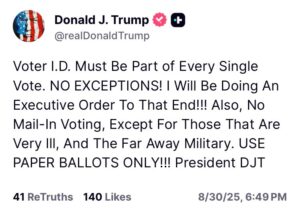President Trump to Ban Mail-In Ballots Except for Emergencies, Demand Voter ID – Experts Say It’s Not His Call.
President Trump to Ban Mail-In Ballots Except for Emergencies, Demand Voter ID – Experts Say It’s Not His Call.

In the USA.
The news as it trends.
President Donald Trump over the weekend announced plans to issue an executive order mandating voter ID for every vote and restricting mail-in voting to only the seriously ill and military personnel stationed abroad.
While his supporters hail this move as a step toward election integrity, constitutional scholars and critics argue it’s not within his authority.
The U.S. Constitution delegates the administration of elections primarily to state governments.
Article I, Section 4 allows Congress to regulate federal elections, but it does not grant the president unilateral power to override state voting laws.
Executive orders can influence federal agencies, but they cannot rewrite state election procedures.
Trump’s proposal would likely face immediate legal challenges. States have long held the right to determine voter eligibility and voting methods, including mail-in ballots.
Courts have consistently ruled that altering these systems requires legislative action—not executive fiat.
This announcement may energize debates around voter fraud, accessibility, and federal overreach. But unless Congress acts or the courts intervene, Trump’s executive order may be dead on arrival.
In the United States, protecting the integrity of elections is essential—but so is honoring the constitutional limits that govern them.
Legal and political experts consistently point out that states alone have the authority to set their own voting rules, including voter ID requirements.
It’s also important to note that President Trump’s claims of widespread voter fraud have been repeatedly dismissed by the courts.
Independent audits and bipartisan reviews have affirmed that U.S. elections remain among the most secure in the world, especially as the midterm elections approach.
Yetunde B reports for Yeyetunde’s Blog.





















Leave a Reply